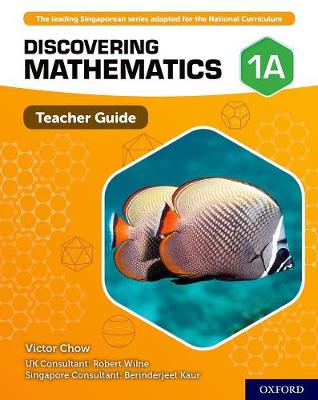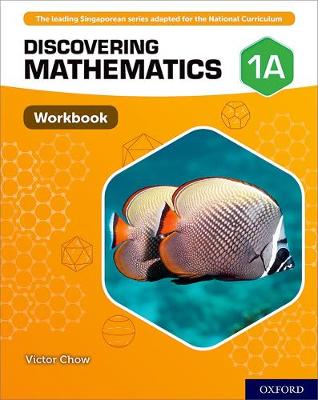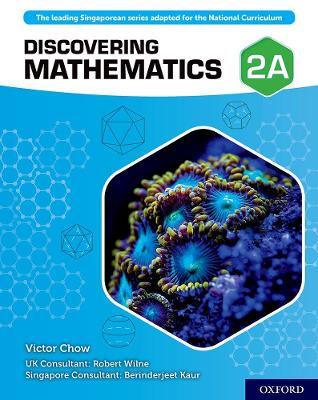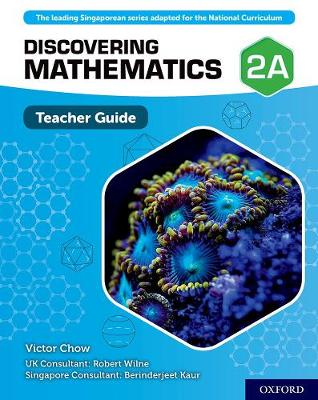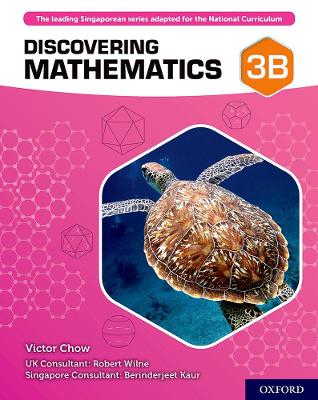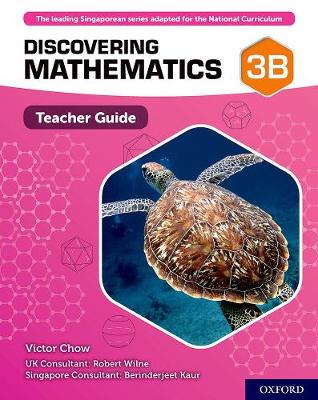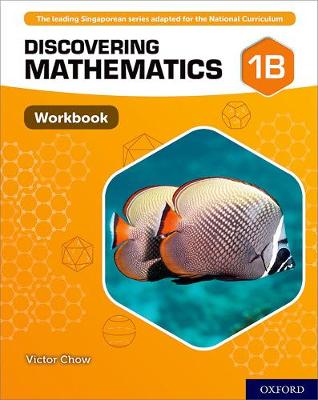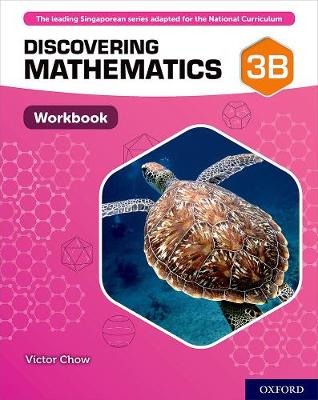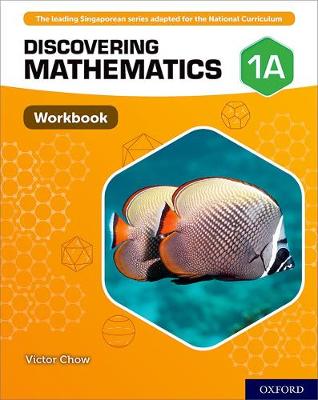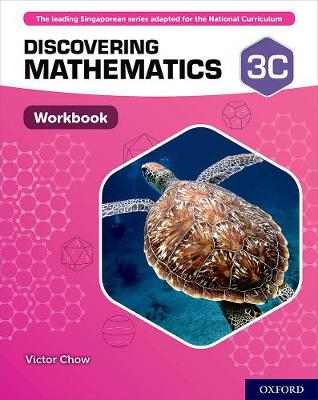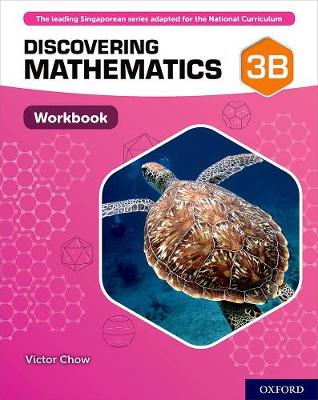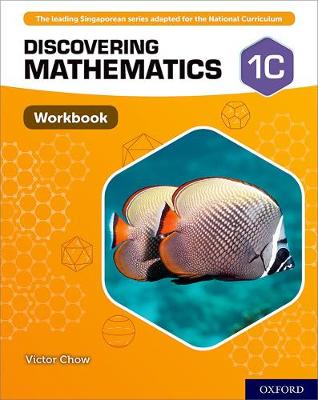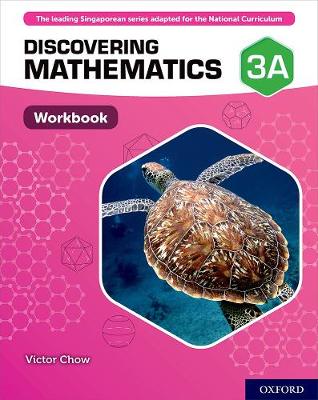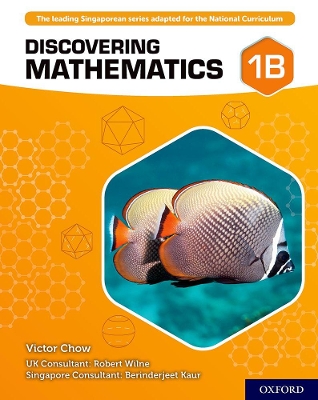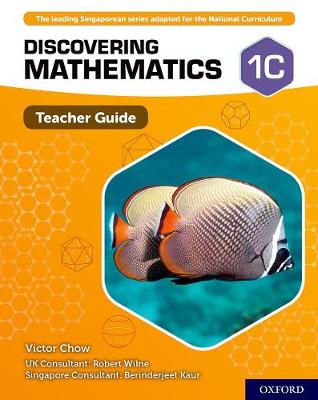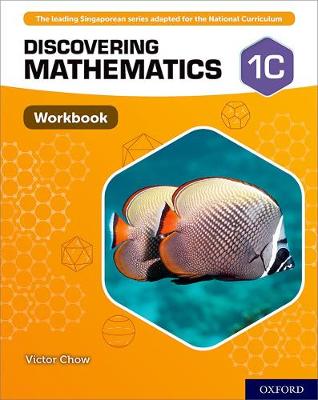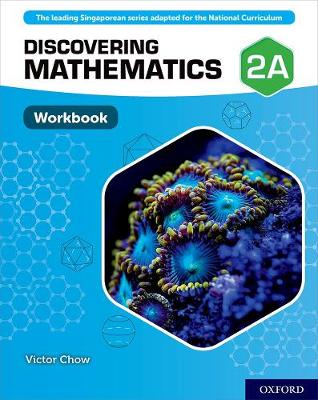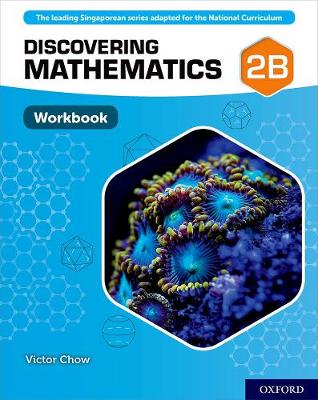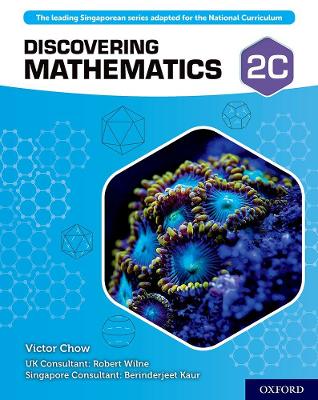Discovering Mathematics
35 total works
Introductory Series Guide for Teachers
by Berinderjeet Kaur, Robert Wilne, and Naomi Norman
all ability levels in Years 7-9.
This introductory guide for teachers provides a short, easy-to-read overview of how this course works and how to embed it successfully in your school. Written by highly experienced UK and Singapore teacher trainers, it covers the key principles of teaching for mastery, the secrets to Singapore's success, and practical tips on how to successfully introduce the approach into your Maths department. Advice is presented clearly, with case studies and illustrated examples.
Annotated pages explain the key features of the series' Student Books, Workbooks, Teacher Guides, Graded Question Banks and digital resources, including how they have been adapted for teaching for the UK. Practical references offer signposting to further information, making this guide a useful resource for both specialist maths teachers and those teaching out-of-field. This guide is an invaluable resource for understanding how to teach for mastery and how to use Discovering
Mathematics.
Teacher Guide supports Student Book 1A for Year 7 Foundation tier students.
A suggested Scheme of Work for Year 7 is included to help you plan your lessons and make the most effective use of the series' resources. For each Student Book chapter, teaching notes give advice on how to approach each topic, and identify common misconceptions. Fully-worked solutions containing GCSE grades are included for all Student Book questions and activities to help you embed good practice among your students and to support their use of mathematical reasoning.
MyMaths links provide an opportunity for further practice, and clear cross-referencing to all of the series' components helps to connect the teaching and learning. This Teacher Guide is the organising link in the series between the Student Book, Workbook, Graded Question Bank and Kerboodle digital content and will support your class on their journey to mastering mathematics.
The Discovering Mathematics workbooks follow authentic mastery principles. Exercises incorporate 'intelligent practice', with careful variation of numbers to reinforce and deepen learning. Questions are differentiated into two levels: Level 1 for basic fluency practice and Level 2 for greater challenge, with additional integrated questions testing the student's ability to apply their learning. Problem-solving questions are identified throughout, and questions related to science and
finance are clearly flagged to encourage students' connections of mathematical ideas across other subjects. The series also encourages use of ICT and research, with exploration exercises helping students to internalise concepts.
This Workbook is designed to enable students to track their progress through a self-assessment checklist at the front. Short answers on the free accompanying website allow students to quickly identify and correct misconceptions. Fully-worked solutions containing GCSE grades are available to teachers on the accompanying Kerboodle digital resource to facilitate support with detailed workings.
Discovering Mathematics: Student Book 2A
by Victor Chow, Robert Wilne, and Berinderjeet Kaur
Topics are introduced through inclusive whole-class activities. Worked examples give clear steps of how to present solutions, with hints and discussion points to encourage paired, group and whole-class working. Practice exercises are differentiated into two levels, progressing from basic fluency to problem solving, with consolidation through end-of-chapter exercises. Short answers are in the back of the book to help students quickly check their understanding, with fully-worked solutions containing GCSE grades in the Teacher Guide. Exercises incorporate 'intelligent practice', with careful variation of the numbers to reinforce and deepen learning. Problem-solving skills are identified throughout, with two dedicated problem-solving sections to support skills development. Students are also encouraged to reflect upon and embed their learning through a Write in Your Journal in every chapter. This Student Book will help students discover the underlying principles of mathematics and set them on the road to mastery.
Discovering Mathematics: Teacher Guide 2A
by Victor Chow, Robert Wilne, and Berinderjeet Kaur
Teacher Guide supports Student Book 2A for Year 8 Foundation tier students.
A suggested Scheme of Work for Year 8 is included to help you plan your lessons and make the most effective use of the series' resources. For each Student Book chapter, teaching notes give advice on how to approach each topic, and identify common misconceptions. Fully-worked solutions containing GCSE grades are included for all Student Book questions and activities to help you embed good practice among your students and to support their use of mathematical reasoning.
MyMaths links provide an opportunity for further practice, and clear cross-referencing to all of the series' components helps to connect the teaching and learning. This Teacher Guide is the organising link in the series between the Student Book, Workbook, Graded Question Bank and Kerboodle digital content and will support your class on their journey to mastering mathematics.
Discovering Mathematics: Student Book 3B
by Victor Chow, Robert Wilne, and Berinderjeet Kaur
Topics are introduced through inclusive whole-class activities. Worked examples give clear steps of how to present solutions, with hints and discussion points to encourage paired, group and whole-class working. Practice exercises are differentiated into three levels, progressing from basic fluency to application to problem solving, with consolidation through end-of-chapter exercises. Short answers in the back of the book help students quickly check their understanding, with fully-worked solutions containing GCSE grades in the Teacher Guide. Exercises incorporate 'intelligent practice', with careful variation of the numbers to reinforce and deepen learning. Problem-solving skills are identified throughout, with two dedicated problem-solving sections to support skills development. Students are also encouraged to reflect upon and embed their learning through a Write in Your Journal in every chapter. This Student Book will help students discover the underlying principles of mathematics and set them on the road to mastery.
Discovering Mathematics: Teacher Guide 3B
by Victor Chow, Robert Wilne, and Berinderjeet Kaur
Teacher Guide supports Student Book 3B for Year 9 Middle tier students.
A suggested Scheme of Work for Year 9 is included to help you plan your lessons and make the most effective use of the series' resources. For each Student Book chapter, teaching notes give advice on how to approach each topic, and identify common misconceptions. Fully-worked solutions containing GCSE grades are included for all Student Book questions and activities to help you embed good practice among your students and to support their use of mathematical reasoning.
MyMaths links provide an opportunity for further practice, and clear cross-referencing to all of the series' components helps to connect the teaching and learning. This Teacher Guide is the organising link in the series between the Student Book, Workbook, Graded Question Bank and Kerboodle digital content and will support your class on their journey to mastering mathematics.
The Discovering Mathematics workbooks follow authentic mastery principles. Exercises incorporate 'intelligent practice', with careful variation of numbers to reinforce and deepen learning. Questions are differentiated into three levels: Level 1 for basic fluency practice, Level 2 for greater challenge, and Level 3 for anlaytical thinking, with additional integrated questions testing the student's ability to apply their learning. Problem-solving questions are identified throughout, and
questions related to science and finance are clearly flagged to encourage students' connections of mathematical ideas across other subjects.
This Workbook is designed to enable students to track their progress through a self-assessment checklist at the front. Short answers on the free accompanying website allow students to quickly identify and correct misconceptions, with fully-worked solutions available to teachers on the accompanying Kerboodle digital resource to facilitate their support with detailed workings.
The Discovering Mathematics workbooks follow authentic mastery principles. Exercises incorporate 'intelligent practice', with careful variation of numbers to reinforce and deepen learning. Questions are differentiated into three levels: Level 1 for basic fluency practice, Level 2 for greater challenge, and Level 3 for anlaytical thinking, with additional integrated questions testing the student's ability to apply their learning. Problem-solving questions are identified throughout, and
questions related to science and finance are clearly flagged to encourage students' connections of mathematical ideas across other subjects.
This Workbook is designed to enable students to track their progress through a self-assessment checklist at the front. Short answers on the free accompanying website allow students to quickly identify and correct misconceptions. Fully-worked solutions containing GCSE grades are available to teachers on the accompanying Kerboodle digital resource to facilitate support with detailed workings.
The Discovering Mathematics workbooks follow authentic mastery principles. Exercises incorporate 'intelligent practice', with careful variation of numbers to reinforce and deepen learning. Questions are differentiated into two levels: Level 1 for basic fluency practice and Level 2 for greater challenge, with additional integrated questions testing the student's ability to apply their learning. Problem-solving questions are identified throughout, and questions related to science and
finance are clearly flagged to encourage students' connections of mathematical ideas across other subjects. The series also encourages use of ICT and research, with exploration exercises helping students to internalise concepts.
This Workbook is designed to enable students to track their progress through a self-assessment checklist at the front. Short answers on the free accompanying website allow students to quickly identify and correct misconceptions, with fully-worked solutions available to teachers on the accompanying Kerboodle digital resource to facilitate their support with detailed workings.
The Discovering Mathematics workbooks follow authentic mastery principles. Exercises incorporate 'intelligent practice', with careful variation of numbers to reinforce and deepen learning. Questions are differentiated into three levels: Level 1 for basic fluency practice, Level 2 for greater challenge, and Level 3 for anlaytical thinking, with additional integrated questions testing the student's ability to apply their learning. Problem-solving questions are identified throughout, and
questions related to science and finance are clearly flagged to encourage students' connections of mathematical ideas across other subjects.
This Workbook is designed to enable students to track their progress through a self-assessment checklist at the front. Short answers on the free accompanying website allow students to quickly identify and correct misconceptions, with fully-worked solutions available to teachers on the accompanying Kerboodle digital resource to facilitate their support with detailed workings.
The Discovering Mathematics workbooks follow authentic mastery principles. Exercises incorporate 'intelligent practice', with careful variation of numbers to reinforce and deepen learning. Questions are differentiated into three levels: Level 1 for basic fluency practice, Level 2 for greater challenge, and Level 3 for anlaytical thinking, with additional integrated questions testing the student's ability to apply their learning. Problem-solving questions are identified throughout, and
questions related to science and finance are clearly flagged to encourage students' connections of mathematical ideas across other subjects.
This Workbook is designed to enable students to track their progress through a self-assessment checklist at the front. Short answers on the free accompanying website allow students to quickly identify and correct misconceptions, with fully-worked solutions available to teachers on the accompanying Kerboodle digital resource to facilitate their support with detailed workings.
The Discovering Mathematics workbooks follow authentic mastery principles. Exercises incorporate 'intelligent practice', with careful variation of numbers to reinforce and deepen learning. Questions are differentiated into three levels: Level 1 for basic fluency practice, Level 2 for greater challenge, and Level 3 for anlaytical thinking, with additional integrated questions testing the student's ability to apply their learning. Problem-solving questions are identified throughout, and
questions related to science and finance are clearly flagged to encourage students' connections of mathematical ideas across other subjects.
This Workbook is designed to enable students to track their progress through a self-assessment checklist at the front. Short answers on the free accompanying website allow students to quickly identify and correct misconceptions, with fully-worked solutions available to teachers on the accompanying Kerboodle digital resource to facilitate their support with detailed workings.
The Discovering Mathematics workbooks follow authentic mastery principles. Exercises incorporate 'intelligent practice', with careful variation of numbers to reinforce and deepen learning. Questions are differentiated into two levels: Level 1 for basic fluency practice and Level 2 for greater challenge, with additional integrated questions testing the student's ability to apply their learning. Problem-solving questions are identified throughout, and questions related to science and
finance are clearly flagged to encourage students' connections of mathematical ideas across other subjects. The series also encourages use of ICT and research, with exploration exercises helping students to internalise concepts.
This Workbook is designed to enable students to track their progress through a self-assessment checklist at the front. Short answers on the free accompanying website allow students to quickly identify and correct misconceptions, with fully-worked solutions available to teachers on the accompanying Kerboodle digital resource to facilitate their support with detailed workings.
Discovering Mathematics: Student Book 1B
by Victor Chow, Robert Wilne, and Berinderjeet Kaur
Topics are introduced through inclusive whole-class activities. Worked examples give clear steps of how to present solutions, with hints and discussion points to encourage paired, group and whole-class working. Practice exercises are differentiated into three levels, progressing from basic fluency to application to problem solving, with consolidation through end-of-chapter exercises. Short answers in the back of the book help students quickly check their understanding, with fully-worked solutions containing GCSE grades in the Teacher Guide. Exercises incorporate 'intelligent practice', with careful variation of the numbers to reinforce and deepen learning. Problem-solving skills are identified throughout, with two dedicated problem-solving sections to support skills development. Students are also encouraged to reflect upon and embed their learning through a Write in Your Journal in every chapter. This Student Book will help students discover the underlying principles of mathematics and set them on the road to mastery.
Teacher Guide supports Student Book 1C for Year 7 Higher tier students.
A suggested Scheme of Work for Year 7 is included to help you plan your lessons and make the most effective use of the series' resources. For each Student Book chapter, teaching notes give advice on how to approach each topic, and identify common misconceptions. Fully-worked solutions containing GCSE grades are included for all Student Book questions and activities to help you embed good practice among your students and to support their use of mathematical reasoning.
MyMaths links provide an opportunity for further practice, and clear cross-referencing to all of the series' components helps to connect the teaching and learning. This Teacher Guide is the organising link in the series between the Student Book, Workbook, Graded Question Bank and Kerboodle digital content and will support your class on their journey to mastering mathematics.
The Discovering Mathematics workbooks follow authentic mastery principles. Exercises incorporate 'intelligent practice', with careful variation of numbers to reinforce and deepen learning. Questions are differentiated into three levels: Level 1 for basic fluency practice, Level 2 for greater challenge, and Level 3 for analytical thinking, with additional integrated questions testing the student's ability to apply their learning. Problem-solving questions are identified throughout, and
questions related to science and finance are clearly flagged to encourage students' connections of mathematical ideas across other subjects.
This Workbook is designed to enable students to track their progress through a self-assessment checklist at the front. Short answers on the free accompanying website allow students to quickly identify and correct misconceptions. Fully-worked solutions contiaining GCSE grades are available to teachers on the accompanying Kerboodle digital resource to facilitate support with detailed workings.
The Discovering Mathematics workbooks follow authentic mastery principles. Exercises incorporate 'intelligent practice', with careful variation of numbers to reinforce and deepen learning. Questions are differentiated into two levels: Level 1 for basic fluency practice and Level 2 for greater challenge, with additional integrated questions testing the student's ability to apply their learning. Problem-solving questions are identified throughout, and questions related to science and
finance are clearly flagged to encourage students' connections of mathematical ideas across other subjects. The series also encourages use of ICT and research, with exploration exercises helping students to internalise concepts.
This Workbook is designed to enable students to track their progress through a self-assessment checklist at the front. Short answers on the free accompanying website allow students to quickly identify and correct misconceptions. Fully-worked solutions containing GCSE grades are available to teachers on the accompanying Kerboodle digital resource to facilitate support with detailed workings.
The Discovering Mathematics workbooks follow authentic mastery principles. Exercises incorporate 'intelligent practice', with careful variation of numbers to reinforce and deepen learning. Questions are differentiated into three levels: Level 1 for basic fluency practice, Level 2 for greater challenge, and Level 3 for anlaytical thinking, with additional integrated questions testing the student's ability to apply their learning. Problem-solving questions are identified throughout, and
questions related to science and finance are clearly flagged to encourage students' connections of mathematical ideas across other subjects.
This Workbook is designed to enable students to track their progress through a self-assessment checklist at the front. Short answers on the free accompanying website allow students to quickly identify and correct misconceptions. Fully-worked solutions containing GCSE grades are available to teachers on the accompanying Kerboodle digital resource, to facilitate support with detailed workings.
Discovering Mathematics: Student Book 2C
by Victor Chow, Robert Wilne, and Berinderjeet Kaur
Topics are introduced through inclusive whole-class activities. Worked examples give clear steps of how to present solutions, with hints and discussion points to encourage paired, group and whole-class working. Practice exercises are differentiated into three levels, progressing from basic fluency to application to problem solving, with consolidation through end-of-chapter exercises. Short answers in the back of the book help students quickly check their understanding, with fully-worked solutions containing GCSE grades in the Teacher Guide. Exercises incorporate 'intelligent practice', with careful variation of the numbers to reinforce and deepen learning. Problem-solving skills are identified throughout, with two dedicated problem-solving sections to support skills development. Students are also encouraged to reflect upon and embed their learning through a Write in Your Journal in every chapter. This Student Book will help students discover the underlying principles of mathematics and set them on the road to mastery.

